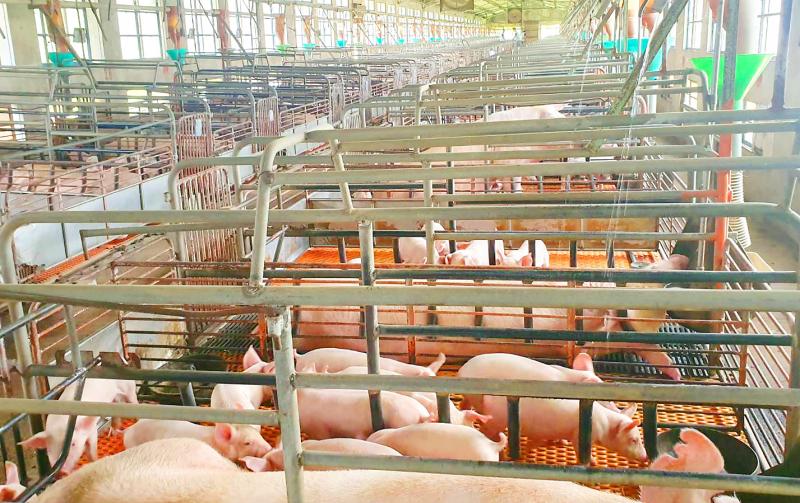The level of ractopamine residue in meat products is regulated by international food safety standards, so people should not worry about imports of US pork containing the additive, former vice president Chen Chien-jen (陳建仁) said yesterday.
Chen made the remarks in response to media queries on the sidelines of the International Medical Forum at Taipei Medical University.
“The government has set food safety standards according to international norms... So, people do not have to worry about food safety,” he said.

Photo: Yang Chin-cheng, Taipei Times
The issue of US pork and beef imports has been a problem for about two decades, and now that it has been resolved, people should accept the policy to facilitate Taiwan-US trade relations, he added.
President Tsai Ing-wen (蔡英文) on Friday announced that Taiwan would ease restrictions on US beef and pork imports, and set standards for ractopamine residue in pork products in an effort to negotiate a trade deal with the US.
The announcement sparked opposition from the Chinese Nationalist Party (KMT) and pig farmers, who raised concerns over its possible negative health effects.
Some local government leaders, including those in Taichung and Yunlin County, said that they would use self-government ordinances to continue implementing a zero-tolerance ban on pork containing ractopamine residue.
Self-government ordinances in Changhua and Hsinchu counties, as well as a few other cities and counties, ban pork containing ractopamine residue.
Chen said the central and local governments need to communicate more on the issue.
Separately yesterday, former president Chen Shui-bian (陳水扁) wrote on Facebook that during his presidency he “repeatedly faced political pressure from the US to allow US beef and pork” imports, adding that his successors, former president Ma Ying-jeou (馬英九) and Tsai, probably did as well.
Chen Shui-bian said he only allowed imports of US beef that was deboned and came from cattle under 30 months old.
As for beef with bones and internal organs, as well as beef and pork from animals over 30 months old, he said “no” to the US, citing scientific evidence and public health concerns, he said.
Chen Shui-bian quoted former American Institute in Taiwan director Stephen Young as saying that the issue of US beef is not one of science or health, but rather a political one.
He said that the US kept pressuring him even toward the end of his second term, when he was acting as the head of a “caretaker government” and could no longer make major decisions.
Chen Shui-bian said that he asked Young to ask Ma, who was then president-elect, whether himself and Ma could share the responsibility and make a joint announcement.
However, Ma was unwilling, Chen Shui-bian said, adding that after Ma assumed office, he was still “forced” to make the decision to allow imports.
The easing of restrictions on US beef and pork imports might, as Tsai said on Friday, be an “important starting point” for comprehensive Taiwan-US economic cooperation and promote Taiwan-US relations, Chen Shui-bian said.
“What Tsai Ing-wen did not say was that she could no longer resist the political pressure from the US,” he added.

Taipei has once again made it to the top 100 in Oxford Economics’ Global Cities Index 2025 report, moving up five places from last year to 60. The annual index, which was published last month, evaluated 1,000 of the most populated metropolises based on five indices — economics, human capital, quality of life, environment and governance. New York maintained its top spot this year, placing first in the economics index thanks to the strength of its vibrant financial industry and economic stability. Taipei ranked 263rd in economics, 44th in human capital, 15th in quality of life, 284th for environment and 75th in governance,

The Sports Administration yesterday demanded an apology from the national table tennis association for barring 17-year-old Yeh Yi-tian (葉伊恬) from competing in the upcoming World Table Tennis (WTT) United States Smash tournament in Las Vegas this July. The sports agency said in a statement that the Chinese Taipei Table Tennis Association (CTTTA) must explain to the public why it withdrew Yeh from the WTT tournament in Las Vegas. The sports agency said it contacted the association to express its disapproval of the decision-making process after receiving a complaint from Yeh’s coach, Chuang

Control Yuan Secretary-General Lee Chun-yi (李俊俋) tendered his resignation last night, admitting that he had misused a government vehicle, as reported by media. His resignation was immediately accepted by the Control Yuan. In a statement explaining why he had resigned, Lee apologized for using a Control Yuan vehicle to transport his dog to a pet grooming salon on May 20. The issue first came to light late last month, when TVBS News reported that Lee had instructed his driver to take the dog to the salon. The news channel broadcast photos that it said were taken by an unnamed whistle-blower, which purportedly showed the

A former officer in China’s People’s Liberation Army (PLA) who witnessed the aftermath of the 1989 Tiananmen Square massacre has warned that Taiwan could face a similar fate if China attempts to unify the country by force. Li Xiaoming (李曉明), who was deployed to Beijing as a junior officer during the crackdown, said Taiwanese people should study the massacre carefully, because it offers a glimpse of what Beijing is willing to do to suppress dissent. “What happened in Tiananmen Square could happen in Taiwan too,” Li told CNA in a May 22 interview, ahead of the massacre’s 36th anniversary. “If Taiwanese students or